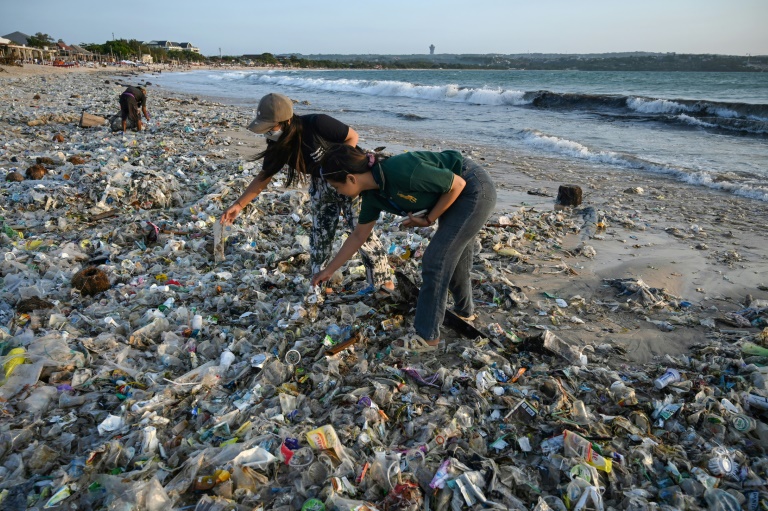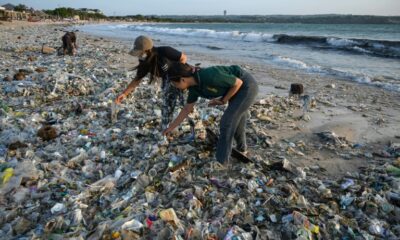Science
New Eco-Friendly Plastic Degrades in Deep Ocean, Study Shows

A recent study reveals that a new biodegradable plastic, known as poly(d-lactate-co-3-hydroxybutyrate) or LAHB, can effectively decompose even in the harsh conditions of the deep ocean. This finding contrasts starkly with traditional plastics, which can persist in marine environments for decades. Researchers from Shinshu University conducted real-world underwater tests at a depth of 855 meters near Hatsushima Island, demonstrating that LAHB lost over 80% of its mass within 13 months, while conventional polylactide (PLA) plastic remained entirely intact.
The ability of LAHB to biodegrade is attributed to colonies of deep-sea microbes that utilize specialized enzymes to break down the plastic into harmless byproducts such as carbon monoxide and water. This breakthrough is significant, especially as plastic pollution continues to escalate globally. According to the 2022 OECD Global Plastics Outlook, approximately 353 million metric tons of plastic waste were produced worldwide in 2019, with nearly 1.7 million metric tons entering aquatic ecosystems.
Research Highlights the Promise of LAHB
The study was led by Professor Seiichi Taguchi at the Institute for Aqua Regeneration, in collaboration with Dr. Shun’ichi Ishii from the Japan Agency for Marine-Earth Science and Technology (JAMSTEC) and Professor Ken-ichi Kasuya from Gunma University. “Our study demonstrates for the first time that LAHB, a microbial lactate-based polyester, undergoes active biodegradation and complete mineralization even on the deep-sea floor, where conventional PLA remains completely non-degradable,” Professor Taguchi stated.
In the study, researchers submerged two types of LAHB films—one with approximately 6% lactic acid (P6LAHB) and another with 13% lactic acid (P13LAHB)—alongside a conventional PLA film for comparative analysis. The underwater conditions, characterized by cold temperatures of 3.6 °C, high salinity, and low dissolved oxygen levels, pose challenges for microbial activity.
After 7 and 13 months of immersion, the LAHB films showed clear evidence of biodegradation. The P13LAHB film experienced a weight loss of 30.9% after seven months and over 82% after 13 months. In stark contrast, the PLA film exhibited no measurable weight loss or visible degradation during the same period, highlighting its resistance to microbial activity.
Understanding the Microbial Action
To comprehend the mechanisms behind the degradation, researchers examined the plastisphere—the microbial community that formed on the surface of the LAHB films. They identified distinct roles among different microbial groups. Dominant Gammaproteobacterial genera, such as Colwellia, Pseudoteredinibacter, Agarilytica, and UBA7957, produced specialized enzymes known as extracellular poly[3-hydroxybutyrate (3HB)] depolymerases. These enzymes are crucial for breaking down long polymer chains into smaller fragments, facilitating further degradation.
Certain microbial species, including UBA7959, produced additional enzymes that cleave these fragments into their monomer components. Once reduced to simpler building blocks, other microbes, including various Alpha-proteobacteria and Desulfobacterota, consume these monomers, ultimately converting the plastic into carbon dioxide, water, and other non-toxic compounds that can reintegrate into the marine ecosystem.
The findings of this research have been published in the journal Polymer Degradation and Stability, in a paper titled “Unveiling deep-sea biodegradation of microbially produced lactate-based polyester (LAHB) via plastisphere metagenomics and metatranscriptomics.” This study not only paves the way for the development of more environmentally friendly plastics but also highlights the critical role of deep-sea microbes in combating plastic pollution.
As global awareness of plastic pollution grows, innovations like LAHB could play a vital role in reducing environmental impact and promoting sustainable practices in material production.
-

 Politics4 weeks ago
Politics4 weeks agoSecwepemc First Nation Seeks Aboriginal Title Over Kamloops Area
-

 World5 months ago
World5 months agoScientists Unearth Ancient Antarctic Ice to Unlock Climate Secrets
-

 Entertainment5 months ago
Entertainment5 months agoTrump and McCormick to Announce $70 Billion Energy Investments
-

 Science5 months ago
Science5 months agoFour Astronauts Return to Earth After International Space Station Mission
-

 Lifestyle5 months ago
Lifestyle5 months agoTransLink Launches Food Truck Program to Boost Revenue in Vancouver
-

 Technology3 months ago
Technology3 months agoApple Notes Enhances Functionality with Markdown Support in macOS 26
-

 Lifestyle3 months ago
Lifestyle3 months agoManitoba’s Burger Champion Shines Again Amid Dining Innovations
-

 Top Stories2 months ago
Top Stories2 months agoUrgent Update: Fatal Crash on Highway 99 Claims Life of Pitt Meadows Man
-

 Politics4 months ago
Politics4 months agoUkrainian Tennis Star Elina Svitolina Faces Death Threats Online
-

 Sports5 months ago
Sports5 months agoSearch Underway for Missing Hunter Amid Hokkaido Bear Emergency
-

 Politics5 months ago
Politics5 months agoCarney Engages First Nations Leaders at Development Law Summit
-

 Technology5 months ago
Technology5 months agoFrosthaven Launches Early Access on July 31, 2025











